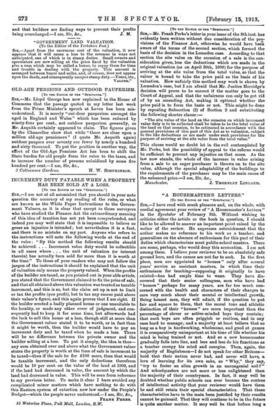INCREMENT DUTY PAYABLE WHEN A PROPERTY HAS BEEN SOLD AT
A LOSS.
[To THE EDITOR 07 THE "SPECTATOR."] SIR,—I am not at all astonished that you should in your note question the accuracy of my reading of the rules, or what are known as the White Paper Instructions to the Govern- ment Valuers, as it is clear that except to those surveyors who have studied the Finance Act the extraordinary meaning of this idea of taxation has not yet been comprehended, and indeed you may well state that it is impossible to believe so gross an injustice is intended ; but nevertheless it is a fact, and there is no mistake on my part. Anyone who refers to the instructions will note the following words at the end of the rules : " By this method the following results should be achieved. . . . Increment value duty would be collectible in all eases where . . . the unit of valuation (or interest therein) has actually been sold for more than it is worth at the time." To those of your readers who may not follow the jargon of the instructions it should be explained that the unit of valuation only means the property valued. When the profits of the builder are taxed, as you pointed out in your able article, you stated that the Government claimed to fix the price of sale, and that all obtained above this valuation was treated as taxable increment, and this is so, but the claim set up is not to limit or tax the profits (qua profit), but to tax any excess paid above their valuer's figure, and this again proves that I am right. If the builder erected a badly planned house or one unsuitable to the locality, or made any other error of judgment, and con- sequently had to keep it for some time, but afterwards had the luck to sell this house at a loss, though still at more than the Government valuer stated it to be worth, or in fact than it might be worth, then the builder would have to pay an increment duty and be taxed when he made a loss. There will be no difference between the private owner and the builder selling at a loss. To put it simply, the idea is thus— any sum obtained over and above what the Government valuer states the property is worth at the time of sale is increment to be taxed—thus if the sale be for £100 more, then that would be taxable increment, and the only deductions therefrom would be 10 per cent. on the value of the land at 1909, and if the land had decreased in value, the amount by which the land had decreased in value. This will be seen from reference to my previous letter. To make it clear I have avoided any complicated minor matters which have nothing to do with this Eastern system of extortion now law under the People's Budget--which the people never understood.—I am, Sir, &c.,
FRANK PRRKS.
.13 Waterloo Place, Pall Mall, London, S.W.










































 Previous page
Previous page